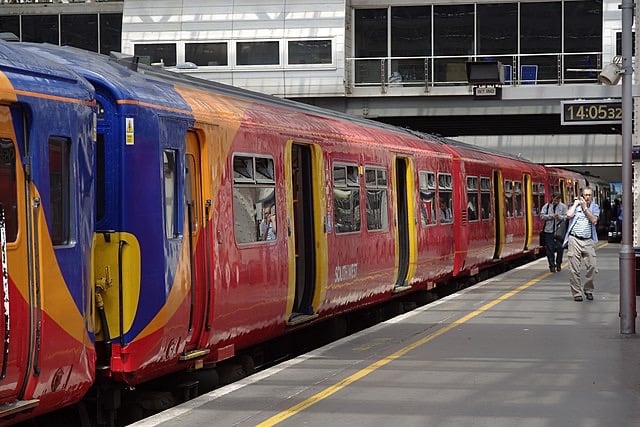Commuters have been warned not to travel this morning after a major signalling failure paralysed operations at London Waterloo, one of Britain’s busiest railway stations.
South Western Railway (SWR) said the failure of critical equipment meant it could not use platforms 1 to 14 at the station, “significantly limiting capacity” and causing severe disruption across the entire network.
The rail operator apologised for the chaos and urged passengers to check for updates, whilst National Rail warned that “major disruption is expected until the end of the day”.
London Waterloo, which handled an estimated 62.5 million passenger entries and exits in 2023/24 according to the Office of Rail and Road, was ranked as the UK’s fourth busiest station last year.
In a statement posted on social media, SWR said: “Due to a major signalling failure at London Waterloo, please do not travel on our services this morning.
The company explained that the equipment failure affecting train routing in and out of the station had rendered more than half of its platforms unusable.
Engineers are on site attempting to restore the use of the platforms, but with very few trains able to move in and out of London Waterloo and trains and crew already displaced, services across the network are severely disrupted,” SWR stated.
The operator warned that whilst they hoped to restore some services later in the day, these would still likely be “subject to delays and alterations.
Passengers have been informed they will not be able to claim taxi fares from SWR, but unused tickets purchased for Monday will be valid on Tuesday “due to the level of disruption”.
The rail company has arranged alternative travel options for affected passengers, with tickets being accepted at no additional cost on several other services.
CrossCountry services between Reading and Bournemouth will honour SWR tickets, as will Southern trains operating between Victoria, Portsmouth Harbour and Southampton Central.
Great Western Railway has also agreed to accept tickets on journeys between Salisbury, Westbury and Weymouth.
Within London, commuters can use their tickets on bus routes between Waterloo and Zone 6 areas, providing some relief for those needing to complete their journeys.
Selected Falcon Buses, Stagecoach and Morebus services will also accept rail tickets as part of the contingency arrangements.
The signalling failure represents a significant blow to London’s transport network, with Waterloo serving as a crucial hub for commuters travelling from Surrey, Hampshire and beyond.
According to the latest ORR statistics, Waterloo has consistently ranked among Britain’s busiest stations, having held the top position for 16 consecutive years before being overtaken by London Liverpool Street following the opening of the Elizabeth line.
The station’s importance to the capital’s transport infrastructure cannot be overstated, with its 19 platforms typically handling hundreds of services daily.
SWR operates one of the busiest commuter networks in Europe, connecting London with major towns and cities across southern England including Southampton, Portsmouth, Bournemouth and Exeter.
The timing of the failure during Monday morning rush hour has maximised the impact on commuters, many of whom rely on Waterloo services to reach workplaces across London.
Network Rail engineers are working to diagnose and repair the signalling equipment, though no timeline has been provided for when normal service might resume.
The incident highlights the vulnerability of Britain’s ageing rail infrastructure, where single points of failure can cause widespread disruption affecting hundreds of thousands of passengers.
Passengers are advised to check journey planners and live departure boards before attempting to travel, with the disruption expected to have knock-on effects throughout the day.
Those who do attempt to travel face the prospect of severe overcrowding on alternative routes as displaced passengers seek other ways to complete their journeys.
The signalling system at Waterloo controls the complex movements of trains in and out of the station, ensuring safe operation across multiple platforms and tracks.
When such systems fail, manual procedures must be implemented, drastically reducing the number of trains that can safely operate.
This latest incident adds to ongoing concerns about the resilience of Britain’s rail network, particularly at major terminals where any disruption can have far-reaching consequences.
Follow for more updates on Britannia Daily
Image Credit:
Waterloo station MMB 12 455903 455722 – Photo by Chris McKenna, licensed under Creative Commons Attribution-Share Alike 4.0 International (CC BY-SA 4.0), via Wikimedia Commons.
View Image



